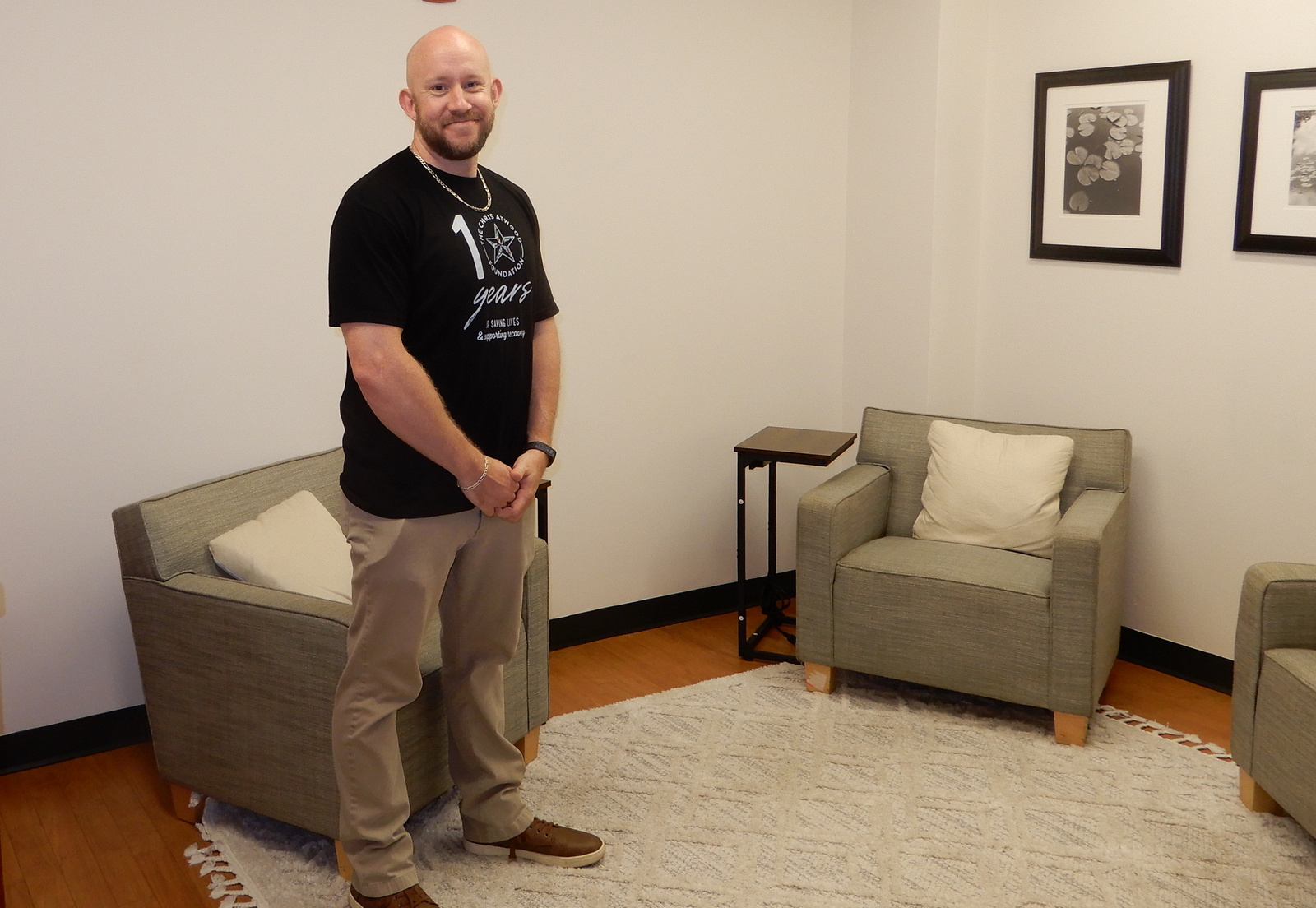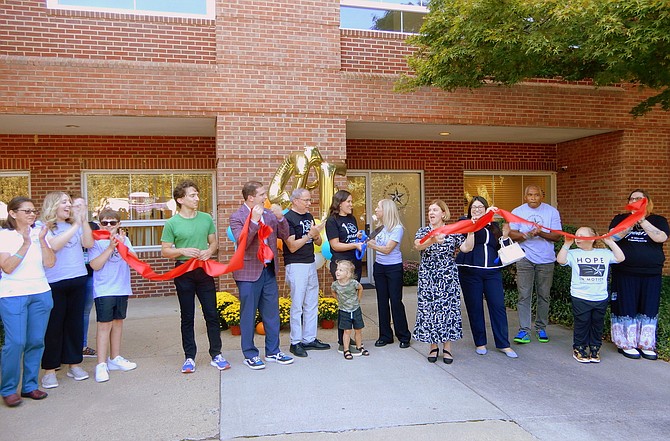Celebrating the recovery center’s ribbon cutting: In the middle (from left) are Fairfax City Councilmembers Billy Bates (green shirt) and Jon Stehle, CAF Board Chairman Mark Atwood, Ginny Atwood Lovitt, Shelly Young and Fairfax Mayor Catherine Read.
Chris Atwood was a warm, loving and intelligent young man who also suffered from anxiety, depression and ADHD. His problems led him into opioid use; and in 2013, when he died of an overdose at age 21, his family members were devastated.
Yet even in their grief, they remained as caring and compassionate as was their late son. And to best honor his memory and help prevent the loss of other lives that way, they established the Chris Atwood Foundation (the CAF) that same year.
This nonprofit helps individuals recovering from substance-use disorder by addressing the gaps in care that people like Chris and others have encountered. With the motto, “No judgment. Just Love,” it provides trained peer support, guidance, referrals and even free Narcan (naloxone) to reverse overdoses.
Previously, the CAF reached people via a mobile unit. But in July, it opened a Recovery Community Center so people could come to an place to receive their services onsite in a safe and friendly environment. And because it’s located in Fairfax City, there’s also access to public transportation, as well as a range of other essential services and partners.
A peer-driven, community organization, the CAF offers free harm-reduction and recovery-support services, plus advocacy, for people impacted by substance use. For example, at the new center, individuals may obtain peer coaching appointments, overdose-reversal training and help finding housing while they’re in recovery.
 Jon Fairbanks in a room where peers meet with certified peer-recovery specialists.
Jon Fairbanks in a room where peers meet with certified peer-recovery specialists.
The new facility is on the ground floor of 10301 Democracy Lane, Suite 150, on the side of the building facing Blenheim Boulevard. And on Sept. 15, a large community of well-wishers gathered there for the official ribbon cutting, a tour of the CAF offices and to celebrate this welcome addition to the City.
“Since opiates came on the scene centuries ago, there have been addiction problems,” said Mayor Catherine Read. “But we always thought it was rare in our communities and families. And I think that was true until oxycontin arrived in this country. It’s in high-school locker rooms and is used by people we know – and we’ve got to do something.
“We have to remove the stigma around addiction and get help for people before they lose their lives. The Chris Atwood Foundation is named for Mark Atwood’s son and Ginny Atwood Lovitt’s brother, Chris, who did succumb to his addiction. And they work every day with people who don’t want to die from theirs.”
“Recovery is hard, and everyone deserves an opportunity to work their way back to their lives,” continued Read. “Here we have an organization committed to helping them, and they chose our city to do it in. I could not be happier to have them here and for all of us to acknowledge that, as a community, we have to support people on their journey to recovery and the people supporting them.”
Co-Founder Atwood Lovitt said how pleased the CAF is to be in Fairfax City. She also thanked its sponsors, including the Fairfax-Falls Church Community Services Board; the Department of Behavioral Health, Office of Recovery Services; and the Anthem Blue Cross and Blue Shield Foundation.
“We’ve now saved over 1,800 lives with naloxone,” she said. “And we’ve given out over 110,000 doses of it as a preventative measure.”
“September is National Recovery Month,” said the CAF Executive Director Shelly Young. “And what better way to celebrate that than to create a hub where people can come and get together with people of lived experience [in recovery from substance use disorder]? We’re so excited to welcome individuals and their families, plus our support partners, to an environment that supports recovery and the community.
“We’ll share information about the services we’re going to bring to the community – services we’ve largely been providing remotely for 10 years,” she continued. “So we’re delighted to be housed in this gorgeous space. We’ve already had 38 people come for appointments with their peer-support specialists whose lived experience makes them the most relatable to people seeking recovery and in recovery. And we’re happy to have an environment of ‘No judgment. Just Love.’”
Gesturing toward the large crowd there for the ceremony, Young noted that the Fairfax County Sheriff’s Office and the Community Services Board are among the CAF’s partners. And, she added, “Some of the most important people here today are our past peers.” She then had them raise their hands to be applauded and stressed that “Peer support is one of the most valuable kinds of support because people with lived experience [with substance-use disorder] really understand.”
After the ribbon cutting, The Connection spoke with some people who work at the center. Jon Fairbanks, the re-entry program manager, said those coming for help are called ‘peers’ and “all the services they receive are free.” His particular niche is working with people with substance-use disorder in the county’s Adult Detention Center.
Beth Cline, the education and training coordinator, said the center has about 23 employees plus weekly volunteers that help with its comprehensive harm-reduction program. “Our mobile unit goes out to the community every week and provides safer-use supplies, such as needles, smoking kits, naloxone, and even pregnancy tests, sanitary pads and tampons,” she said. “We go throughout Fairfax and Prince William counties, and 5-10 volunteers at a time help pack those supply kits.”
Cline said the center is also for anyone with mental-health challenges. “And almost all the employees are people who have a family member who is or was affected by drug or alcohol use, or mental challenges, or who has experienced them personally,” she said. “We hold hope for people who can’t hold it for themselves.”
She trains the peer-recovery specialists; and for those coming there for help, said Cline, “It’s different from working with a clinician or therapist. We have that deeper knowledge about what they’re going through – and, yes, I’ve been there and I know what it’s like.
“And that’s what’s so cool about it,” she added. “It’s one-on-one coaching and development. And we give people resources. For example, we tell them where to go for food, clothes or treatment.”
Elix Wingfield is currently an intern there; but after working 500 hours, he’ll be one of the certified peer-recovery specialists. “I came here because I wanted to help people that went through the same problems I had,” he explained. “I had a substance-use disorder and went to prison, about 30 years ago.
“But I’m still being persecuted and losing jobs because of my record. I believe that, after staying out of trouble for a long time, your record should be expunged. So I’m fighting for advocacy and to get my voting rights back.”
Pleased to be working at the center, Wingfield described it as “refreshing and fulfilling knowing I’m able to help someone through my own, personal experience. And who would have thought that what happened to me could help somebody else? But it’s easier for people to open up to you when they know you really understand and empathize with them. It’s real – and that’s where the connection comes from.”
For more information, go to www.thecaf.org. To make an appointment to speak with a certified peer-recovery specialist, call 703-653-4221.
